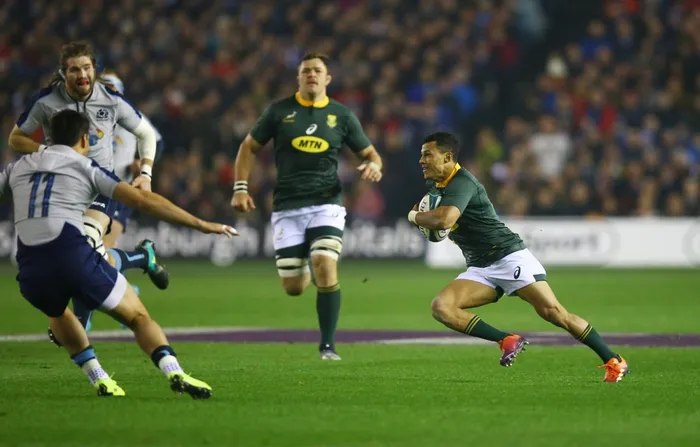Boks must set a brave tone heading towards #RWC2019

Starting in his first test, Embrose Papier goes on the attack against Scotland on Saturday. Photo: @Springboks on twitter Starting in his first test, Embrose Papier goes on the attack against Scotland on Saturday. Photo: @Springboks on twitter
DURBAN – When the Springboks took on England at the home of rugby, it was all about a chess battle between two giants with a referee deciding the outcome.
Against the French, heavyweight players tried to outmuscle each other and win the game through attrition. However, against Scotland, at Murrayfield on Saturday it was a totally different story.
The Scots have inherited a Kiwi DNA thanks to their previous coach, Vern Cotter, and that has been helped with Scotsman Gregor Townsend being happy to build upon that plan.
So, while that New Zealand-style of play can catch out a number of teams, including England, the Boks were ready for it. The Boks managed to claim a win in New Zealand against the mighty All Blacks playing a game of patient attack with perfect timing, and against the Scots, it was nothing different. Jesse Kriel’s opening try on Saturday was perfect proof of what the South Africans are capable of in perfect conditions.
Handre Pollard was on song when he spotted a gap in the rush defence, stepping inside, then out, to spark one of the best Bok tries seen under coach Rassie Erasmus. As soon as Pollard made the break, suddenly the Boks were on. Embrose Papier was on his shoulder for a no-look offload, and then even loosehead prop Steven Kitshoff was ready to take the next pass, and offload in the tackle to keep the move alive.

South Africa’s Embrose Papier, left, launches a box-kick during Saturday’s match against Scotland at Murrayfield in Edinburgh. Photo: Scott Heppell/Associated Press
The lead up to Kriel’s try was pure evidence of what the Boks can do, and are certainly trying to do. There is no doubting that Erasmus’ Boks have been told to make sure they finish off the chances that come their way, and when Pollard made that break, every one on hand was certain that they would do everything they could to score the try.
While that try was built on fluid and dynamic play, that could not be structured or predicted, what was pleasing was the build up. The Boks’ attack was measured and assured, probing and seeking any gap that could come with absolute structure and understanding, but as soon as the hole was found, the team sprung into action.
Kitshoff’s role in that try speaks volumes of what the Boks are capable of. It did not matter that he was a tight forward, he was going to play his part to keep the ball alive rather than go to ground as is often expected and understood when the props get involved.
Even when a ruck was finally formed, five metres short of the line, Papier was sharp and fast enough to quickly feed an onrushing Kriel who could not be stopped as he stretched over the line. The Boks have, in their first two games on their end-of-year tour been criticised of being too sloppy and predictable in attack, but against Scotland they sparked into life, really lifting their attack to match, and outshone their opponents. It is pleasing to see what the South Africans are capable of, but it is also concerning that they need an attacking threat to kick off their true attacking potential.
Jesse Kriel and Pieter-Steph du Toit in the post-match press conference at Murrayfield. "Scotland is a dangerous side so we're very satisfied with the win tonight, " said Kriel. #boksontour #SCOvRSA pic.twitter.com/ju8Pa2kMFu
— South African Rugby (@Springboks) November 17, 2018
That being said, in the immediate future, the Welsh are next up, and they managed to score nearly 80 points against Tonga in their match on Saturday. If the Welsh come out with the same attacking intent, there is every expectation that the Boks can match, and outshine their opponents.
But, heading towards Japan 2019, these Boks need to be brave enough to set the attacking tone they are clearly capable of from the first minute.